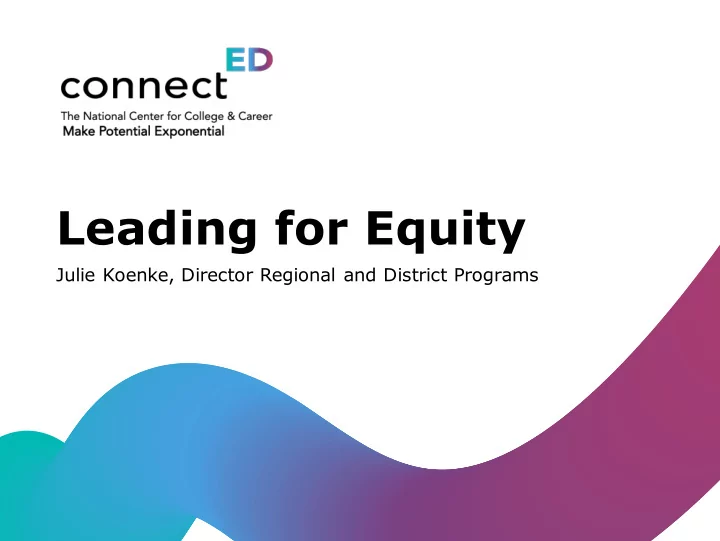

Leading for Equity Julie Koenke, Director Regional and District Programs
The Reckoning
“When we allow ourselves to be shielded and disconnected from those who are vulnerable and disfavored,” we lose our effectiveness, but “proximity is a pathway through which we learn the kind of things we need to know to make healthier communities .” Bryan Stevenson
4 I’s of Oppression Ideological Institutional Oppression Oppression Internalized Interpersonal Oppression Oppression
Ideological Oppression A system of beliefs or ideas
Institutional Oppression Using the laws, the legal system, the education system, public policy, media, political power, etc... to maintain ideology
Interpersonal Oppression The idea that one group is better than another and has the right to dominate/control the other
Internalized Oppression The oppressor doesn't have to exert any more pressure, because we now do it to ourselves and each other
4 I’s of Oppression Systems, Political Power and Policies Ideological Institutional Oppression Oppression Beliefs Structures and and Values Practice Internalized Interpersonal Oppression Oppression Relationships
Table Talk What resonates? • As you think about your • local equity efforts, what are you actively addressing(4 I’s )? What aren’t you tending • to? Where are your challenges? • Where might you need to • take some actions?
Leadership and Governance 1. Take a moment and quietly read through the rubric 2. Rate your team, your community 3. Share/Discuss your ratings with a colleague or your team 4. Identify your top 1 or 2 priorities
“You know the adage “People resist change.” It is not really true. People are not stupid. People love change when they know it is a good thing. No one gives back a winning lottery ticket. What people resist is not change per se, but loss. When change involves real or potential loss, people hold on to what they have and resist the change.” - Ronald Heifetz
SCARF AUTONOMY RELATEDNESS STATUS CERTAINTY FAIRNESS Our sense of Our sense of Our relative Our ability to Our sense of control over safety with predict the fair exchanges importance events other future between to others people
Table Talk What resonates? • As you think about your • local equity efforts, what are you actively addressing What aren’t you tending • to? Where are your challenges? • Where might you need to • take some actions?
Team Time
Thank You & Questions Julie Koenke ConnectEDNational.org jkoenke@ConnectEDNational.org facebook.com/ConnectEDNational @connectEDorg
Recommend
More recommend